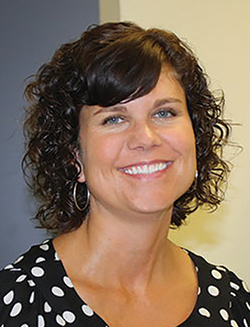Thyroid Cancer Survivor
Take Charge of Your Own Health
 A diagnosis of thyroid cancer at age 41 has taught Gail Carpenter, a teacher, to learn more about herself and her health. She researched and became self-educated on the benefits of health and nutrition after surgery, and now she encourages other survivors to advocate for themselves during and after treatment.
A diagnosis of thyroid cancer at age 41 has taught Gail Carpenter, a teacher, to learn more about herself and her health. She researched and became self-educated on the benefits of health and nutrition after surgery, and now she encourages other survivors to advocate for themselves during and after treatment.
I had difficulty losing weight, so I went to a weight loss clinic during a summer break from school. A doctor there thought I had a problem with my thyroid. He prescribed a weight loss drug to help me lose weight, and it helped. However, I wanted to follow up with an endocrinologist to get my thyroid checked. The endocrinologist noticed that my thyroid was enlarged, so a biopsy was taken for testing.
During the first day back at school, I got the phone call telling me that I had been diagnosed with thyroid cancer. She told me that it was the “good kind of cancer” and that I had a 99 percent chance of survival. She said, “If you are going to get cancer, this is the kind to have.” The tumor was smaller than the size of a pea. Because of my age and the tumor size, my cancer was never actually staged.
The first person I talked to about my diagnosis was a close friend who is a breast cancer survivor. It was nice to have someone to talk to who has gone through something similar. She was supportive and helped me do constructive research.
Telling my dad was difficult because I was worried about how the stress of my diagnosis would affect him. He was a colon cancer and bladder cancer survivor, and my mom passed away from lung cancer. His experiences with cancer made him an excellent caregiver, and he responded by actively helping me through treatment and recovery.
I talked to a surgeon about my treatment options and he recommended a total thyroidectomy, which is the complete removal of the thyroid. He told me that there would be a chance that he could knick my vocal chords during the surgery, and that I would be without a voice for up to eight weeks. I decided to get a second opinion. I researched and found a surgeon who could remove the thyroid during a minimally invasive surgery, resulting in a smaller scar.
Before the surgery, my friend helped me do more treatment research, and I found support groups in my area. In the support group I joined, no one seemed hopeful about the disease, and I was the only one with an early-stage cancer. I found myself in a place that was filled with despair. What I thought would be a helpful experience turned out to be terrifying, so I attended only one of their meetings.
Following surgery, I was off work for three weeks. Recovery was more difficult than I had thought. The first day, I only had enough energy to leave my bed to take a shower. I was told by my doctor not to lift anything, and I became very dependent on my dad, who came over to make meals and take care of me for the first week after surgery. The rest of my recovery was spent reading, watching television or doing other sedentary activities while I regained my strength.
I wish that I’d known then what I know now about the thyroid and its important function. The thyroid controls many things in the body that I took for granted. Taking it out makes you hypothyroid, meaning your thyroid doesn’t produce enough hormones. You have to take a prescribed synthetic hormone medication to replace the hormones that your body can no longer make. Essentially, during surgery, they take out this organ that controls all this stuff in your body, and then they give you a pill that is supposed to do what your organ is supposed to do. However, it didn’t work that way for me.
My endocrinologist checks my thyroid hormone levels to ensure my numbers and prescription dosage are correct. Technically, I am not hypothyroid anymore because my hormone levels are where they’re supposed to be, but I still have a lot of symptoms. I become fatigued fairly easily and have some cognitive dysfunction, such as brain fog. I sometimes feel moody or irritable. I’ve also gained weight, and losing weight is very difficult.
Having the correct synthetic hormone dosage is important, but taking care of your body and being healthy are equally important components of your care. Together, they will help make you feel better after treatment.
I take my health into my own hands now, and I have learned that nutrition is extremely important. I focus on eating well and maintaining a healthy diet. I try to exercise regularly, though I still don’t exercise enough, and I take vitamins and supplements. I monitor how I feel very closely, and I try new things to see what helps me feel better. Learning to understand your body and what it needs takes time, but I have found a balance that I am happy with.
You can sit back and say that you don’t feel well or you can take charge of your health. Do your own research and find things that help make you feel better. Try one thing at a time and see how it makes you feel. Be an advocate for yourself, and do whatever you can to make yourself feel better.


